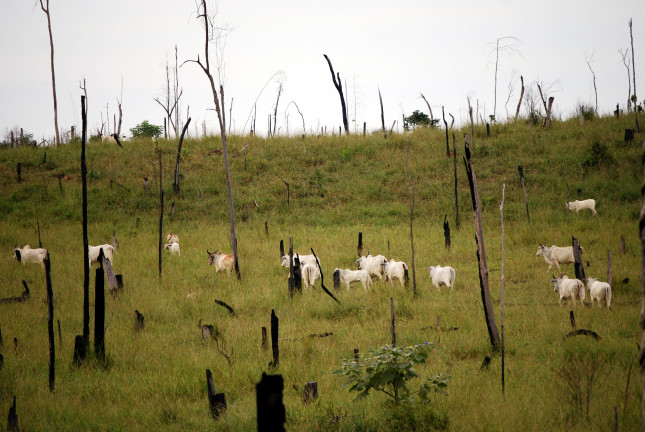-
China’s Silent Greening
China is Brazil’s main trading partner and accounts for over a quarter of all Brazilian exports. Yet two of the largest products in this trading relationship—beef and soybeans—are also crops that drive deforestation in the Amazon. Brazil’s deforestation rates declined substantially between 2004 and 2012, but forest clearage needed to raise cattle reversed the trend: The Amazon lost 10,476 square kilometers of rainforest in 2021, the highest total in the decade.
Western leaders have criticized the Brazilian government over this forest clearage boom. They have also passed laws to restrict trade and capital flows linked to deforestation. These measures have been enacted unevenly, however. The European Union halted imports of Brazilian beef in January 2023, whereas U.S. demand for Brazilian beef is spiking.
Indeed, politicians and leaders of Brazil’s agribusinesses believe China’s insatiable appetite for Brazilian beef and soy will balance out any losses from Western-imposed deforestation restrictions. Chinese beef imports have continued to rise, and many have perceived China’s silence on the growing deforestation in the Amazon as complacency.
Yet China has actually begun to take actions to rein in the negative environmental impacts of its demand for soy and beef. It is a trend that could strain relations between the two countries, but also opens an opportunity for agricultural collaboration, strengthened transparency, and reforestation efforts in the Amazon.
Under Construction: A Great Green Wall (to Brazil)
Brazilian exporters and western observers often misinterpret China’s environmental actions at home and abroad. For instance, China has been struggling with pollution and the effects of environmental degradation and desertification. But the Chinese government has made significant investments to tackle those issues—including adopting the goal of achieving an “ecological civilization” in 2007.
In fact, China has been going through a silent “greening” domestically over the last four decades, as growing grassroots movements and expansive pollution and conservation policies come into confluence with private sector innovations in green technologies. Chinese policymakers began to look beyond China’s borders in recent years, and now take an active role in reducing greenhouse emissions and fostering biodiversity conservation abroad. China has also become a global leader in forest restoration and renewable energy capacity growth.
These efforts are also seen on the deforestation front. A report from the China Council for International Cooperation on Environment and Development (CCICED) recommended launching a pilot program to establish best practices for greening the global value chains for soy, palm oil, and forest products. While China does not have a policy in place to ensure the import of deforestation-free agricultural commodities at present, the revision of its Forest Law (2019) has introduced a ban on the purchase, processing, or transportation of illegally sourced timber. China’s increased transparency and extension of the due diligence process in the timber supply chain could be a model applied to other agricultural commodities in the future, making it more difficult for these products to access a relevant market.
Boosting Conservation and Catalyzing Traceability
China has also been positioning itself as a leader in agreements to combat the deforestation and ecosystem degradation caused by supply chains.
At the global climate talks in Glasgow (COP26), China joined the United States in a pledge to end global illegal deforestation by effectively enforcing their respective laws on banning illegal imports. China also led efforts in 2022 that saw 188 out of the 196 countries that make up the COP CBD adopt the “Kunming-Montreal Global Biodiversity Framework” (GBF)—a global goal to conserve 30 percent of the world’s terrestrial and marine habitats by 2030. China’s leadership has encouraged efforts to achieve this goal both at home and abroad and appears committed to continuing biodiversity protection actions.
China’s private sector has also taken steps to eliminate deforestation from its supply chains. In 2017, the China Meat Association announced efforts to establish traceability and avoid deforestation. Likewise, COFCO, China’s largest food company, has committed to ensuring full traceability of its suppliers and eliminate deforestation by 2020, while also obtaining $2.1 billion in sustainability-linked loans.
A growing number of Chinese environmental nongovernmental organizations have helped catalyze action on issues that range from nature conservation to low-carbon international trade. The Global Environmental Institute (GEI), a leading Chinese environmental NGO, has adopted a strategic approach by engaging public and private stakeholders to build consensus and organize pilot projects with Brazilian stakeholders.
One of the first fruits of this relationship was a first-of-its-kind memorandum of understanding (MOU) between GEI and four Brazilian parties signed in 2022. The MOU promotes the import of sustainably produced beef, such as carbon-neutral beef, from the Brazilian state of Mato Grosso to the Chinese market and is supported by a pilot traceability system.
International NGOs are also working closely with Chinese authorities and companies on greening agricultural supply chains in Brazil. The NGO Solidaridad Brazil has facilitated the development of the China Sustainable Soy Guidelines in concert with the Sustainable Soy Trade Platform Advisory Group—which is comprised of China’s soy-related industry associations, companies, and industry experts. The World Wildlife Fund, the Round Table on Responsible Soy Association, the Carbon Disclosure Project, and other institutions have also been working closely with Chinese officials as part of building a collaborative network on sustainable supply chains.
Sustainability in the Brazil-China Agricultural Relationship
China’s burgeoning efforts to green its agricultural supply chains present a great opportunity for Brazil, which is one of the few countries with the capacity to increase its food production while simultaneously enforcing a zero-deforestation policy. The newly elected Brazilian government is prioritizing the issue of deforestation control in the Amazon and has already offered to host the UNFCCC COP 30 conference in the Amazon city of Belem.
One encouraging sign that Brazil and China are moving towards more sustainable agricultural development became clear during Brazilian President Luiz Inacio Lula da Silva’s visit to China on April 15. This visit produced 15 bilateral agreements, including the two joint statements that prioritized taking action on climate change, deforestation, and sustainable investment.
Both Brazil and China share a common interest in greener supply chains and investing in the development of systems for the traceability of agricultural commodities. A great synergy exists in what can become a win-win relationship. Although China’s greening may be silent for now, it is surely underway.
Rodrigo Bellezoni is a Specialist at the Center for Territorial Intelligence at the Federal University of Minas Gerais in Brazil.
Peng Ren is the Program director of Overseas Investment, Trade and the Environment at the Beijing-based Global Environmental Institute.
Zhao Zhong is a Visiting Scholar at Paul Tsai China Center, Yale Law School and the founder and director of the Lanzhou-based NGO Green Camel Bell. He recently spoke at a China Environment Forum event China’s biodiversity action overseas.
Sources: Al Jazeera, CEPEA, China Meat Association, COFCO International, Convention on Biological Diversity, Global Environmental Institute, Investor Statement on Deforestation and Forest Fires in the Amazon, O Eco Association, Solidaridad, Sustainable Soy Trade, The Guardian, U.S. Department of State, UN Climate Change Conference UK 2021, USDA
Photo Credit: Recently cut and burned rainforest turned into a cattle ranch in the Brazilian Amazon, courtesy of Frontpage/shutterstock.com.
 A Publication of the Stimson Center.
A Publication of the Stimson Center.







